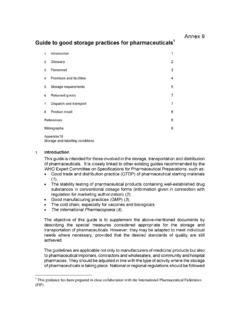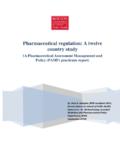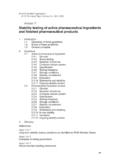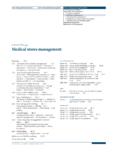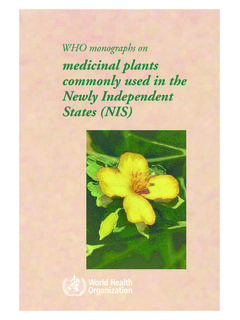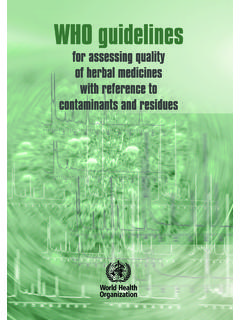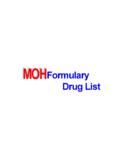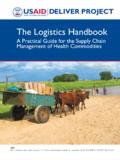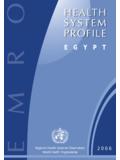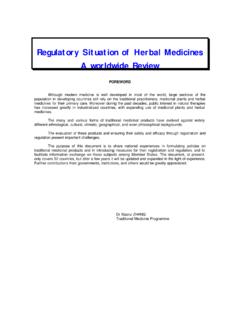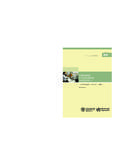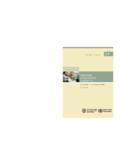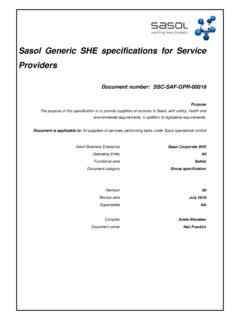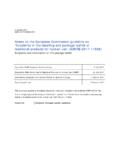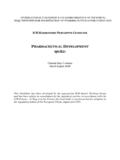Transcription of WHO EXPERT COMMITTEE ON SPECIFICATIONS …
1 IWHO Technical Report Series908 WHO EXPERT COMMITTEE ON SPECIFICATIONS FOR pharmaceutical PREPARATIONSAT hirty-seventh ReportaAWorld Health OrganizationGenevaOMM Cover11/6/03, 6:07 PM1iiThe World Health Organization was established in 1948 as a specialized agencyof the United Nations serving as the directing and coordinating authority forinternational health matters and public health. One of WHO s constitutional func-tions is to provide objective and reliable information and advice in the field ofhuman health, a responsibility that it fulfils in part through its extensive programmeof Organization seeks through its publications to support national health strat-egies and address the most pressing public health concerns of populationsaround the world.
2 To respond to the needs of Member States at all levels ofdevelopment, WHO publishes practical manuals, handbooks and training materialfor specific categories of health workers; internationally applicable guidelines andstandards; reviews and analyses of health policies, programmes and research;and state-of-the-art consensus reports that offer technical advice and recommen-dations for decision-makers. These books are closely tied to the Organization spriority activities, encompassing disease prevention and control, the developmentof equitable health systems based on primary health care, and health promotion forindividuals and communities.
3 Progress towards better health for all also demandsthe global dissemination and exchange of information that draws on the knowledgeand experience of all WHO s Member countries and the collaboration of worldleaders in public health and the biomedical ensure the widest possible availability of authoritative information and guidanceon health matters, WHO secures the broad international distribution of its publica-tions and encourages their translation and adaptation. By helping to promote andprotect health and prevent and control disease throughout the world, WHO s bookscontribute to achieving the Organization s principal objective the attainment byall people of the highest possible level of WHO Technical Report Series makes available the findings of various interna-tional groups of experts that provide WHO with the latest scientific and technicaladvice on a broad range of medical and public health subjects.
4 Members of suchexpert groups serve without remuneration in their personal capacities rather thanas representatives of governments or other bodies; their views do not necessarilyreflect the decisions or the stated policy of WHO. An annual subscription to thisseries, comprising about six such reports, costs Sw. fr. 132. or US$ 106. (Sw. in developing countries). For further information, please contact Marketingand Dissemination, World Health Organization, 20 avenue Appia, 1211 Geneva27, Switzerland (tel.: +41 22 791 2476; fax: +41 22 791 4857; report contains the collective views of an international group of experts anddoes not necessarily represent the decisions or the stated policy of the World Health OrganizationWHO Technical Report Series908 WHO EXPERT COMMITTEEON SPECIFICATIONS FORPHARMACEUTICAL PREPARATIONST hirty-seventh ReportWorld Health OrganizationGeneva 2003 WHO Library Cataloguing-in-Publication DataWHO EXPERT COMMITTEE on SPECIFICATIONS for pharmaceutical Preparations (2001: Geneva, Switzerland)WHO EXPERT COMMITTEE on SPECIFICATIONS for pharmaceutical Preparations: thirty-seventh report.)
5 (WHO technical report series; 908) preparations Standards , pharmaceutical standards standards control standards 92 4 120908 9(NLM classification: QV 771)ISSN 0512-3054 World Health Organization 2003 All rights reserved. Publications of the World Health Organization can be obtained from Marketing andDissemination, World Health Organization, 20 Avenue Appia, 1211 Geneva 27, Switzerland (tel: +41 22791 2476; fax: +41 22 791 4857; email: Requests for permission to reproduce ortranslate WHO publications whether for sale or for noncommercial distribution should be addressed toPublications, at the above address (fax: +41 22 791 4806.))
6 Email: designations employed and the presentation of the material in this publication do not imply theexpression of any opinion whatsoever on the part of the World Health Organization concerning the legalstatus of any country, territory, city or area or of its authorities, or concerning the delimitation of its frontiersor boundaries. Dotted lines on maps represent approximate border lines for which there may not yet befull mention of specific companies or of certain manufacturers products does not imply that they areendorsed or recommended by the World Health Organization in preference to others of a similar naturethat are not mentioned.
7 Errors and omissions excepted, the names of proprietary products are distin-guished by initial capital World Health Organization does not warrant that the information contained in this publication iscomplete and correct and shall not be liable for any damages incurred as a result of its publication contains the collective views of an international group of and does not necessarilyrepresent the decisions or the stated policy of the World Health in Hong KongPrinted in Singapore2002/14377 SNPBest-set/SNP for medicinal plant materials and for of transmitting animal spongiform
8 Encephalopathy agentsvia medicinal TB Back Malaria of The International Discussion Group (PDG) Conference on Harmonisation (ICH) control SPECIFICATIONS and chromatography screening tests for monographs on chromatography screening tests for monograph on rifampicin, isoniazid, pyrazinamide andethambutol hydrochloride control international reference control national quality assessment estimate of equipment for model quality assurance good manufacturing practices (GMP) GMP guidelines for radiopharmaceutical guide for active pharmaceutical GMP: main principles for pharmaceutical basic training modules on assurance certificates of for GMP inspection assurance distribution and trade and distribution practices of pharmaceuticalstarting Scheme for the Certification of pharmaceutical StartingMaterials Moving in International Commerce.
9 Guidelines Certification Scheme on the Quality of PharmaceuticalProducts Moving in International assurance risk analysis in quality control and of hazard analysis and critical control point(HACCP) methodology for assurance drug for assessing the acceptability for purchase ofpharmaceutical for assessing the acceptability for purchase ofpharmaceutical products for the treatment of assurance guidelines for stability testing of pharmaceutical productscontaining well-established drug substances in conventionaldosage storage Nonproprietary Names (INNs) to the WHO EXPERT COMMITTEE by the ScientificWorking Group on Bioequivalence of the InternationalPharmaceutical Federation (FIP) tests for quality version of reporting of documents for procedural consultation process15 Acknowledgements15 References19 Annex 1 Recommendations on risk of transmitting animal spongiformencephalopathy agents via medicinal products21 Annex 2 The International Pharmacopoeia: revised concepts and futureperspectives22 Annex 3 Guidelines on Good Manufacturing Practices for radiopharmaceuticalproducts26 Annex 4 Good Manufacturing Practices for pharmaceutical products.
10 Mainprinciples36 Annex 5 Model certificate of Good Manufacturing Practices90 Annex 6 Guidance on Good Manufacturing Practices (GMP): inspection report94vAnnex 7 Application of Hazard Analysis and Critical Control Point (HACCP)method to pharmaceuticals99 Annex 8 Procedure for assessing the acceptability, in principle, of pharmaceuticalproducts for purchase by United Nations agencies113 Annex 9 Guide to good storage practices for pharmaceuticals125viWHO EXPERT COMMITTEE on SPECIFICATIONS for PharmaceuticalPreparationsGeneva, 22 26 October 2001 Members*Professor I. Addae-Mensah, Vice-Chancellor, University of Ghana, Accra, Ghana(Chairperson)Ms K.
